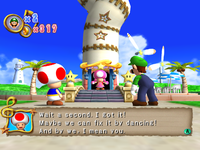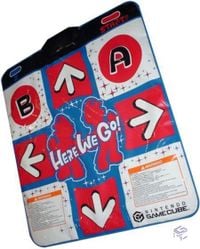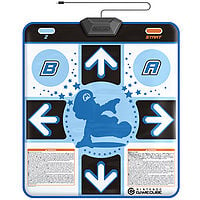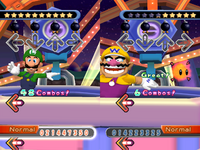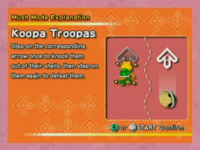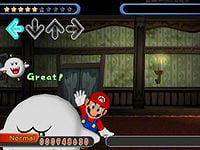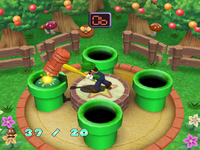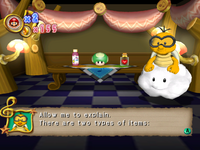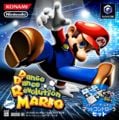Dance Dance Revolution: Mario Mix: Difference between revisions
Theyoshisaur (talk | contribs) m (→Difficulties) |
|||
| Line 86: | Line 86: | ||
===Difficulties=== | ===Difficulties=== | ||
[[File:Ddrsuperhard.jpg|200px|thumb|left|An example of Super Hard difficulty.]] | [[File:Ddrsuperhard.jpg|200px|thumb|left|An example of Super Hard difficulty.]] | ||
<span style="color:#0000FF">'''Easy:'''</span> only includes left and right arrows | <span style="color:#0000FF">'''Easy:'''</span> only includes left and right arrows.<br> | ||
<span style="color:#FF6600">'''Normal:'''</span> basic steps.<br> | <span style="color:#FF6600">'''Normal:'''</span> basic steps.<br> | ||
<span style="color:#FF3399">'''Hard:'''</span> steps get near 200 at times. Common patterns appear in step sequences.<br> | <span style="color:#FF3399">'''Hard:'''</span> steps get near 200 at times. Common patterns appear in step sequences.<br> | ||
Revision as of 19:33, April 3, 2017
Template:Infobox Dance Dance Revolution: Mario Mix (known as Dance Dance Revolution with Mario in Japan and Dancing Stage: Mario Mix in Europe) is a Nintendo GameCube game based on the popular Dance Dance Revolution video game series, but with a Mario theme. Mario Mix utilizes an included Mario-themed dance mat. To play the game, players must step on the up, down, left, and right arrows when they line up with a bar on the screen. The player can choose to play with either Mario or Luigi in a number of modes and difficulty levels with nearly thirty songs.
Dance Dance Revolution: Mario Mix is the second dancing game to be released on the Nintendo GameCube. Mario Mix is not as intense as standard versions of Dance Dance Revolution; Super Hard difficulty is equivalent to "standard" difficulty in other Dance Dance Revolution games (though some later songs are considered "heavy" in the standard games, especially Bowser's Castle).
Story Mode
The game includes a Story Mode, which the player must clear in order to unlock all of the songs in the game. The playable characters are Mario and Luigi. The opening scene starts out with Waluigi breaking into Truffle Towers. This is trouble as the Music Keys are able to grant any wish. However, when Waluigi opens the door to the room of the four Music Keys, they all scatter across the Mushroom Kingdom except for one that Waluigi gets to keep. Meanwhile, Toad, having seen this, rushes to tell Mario or Luigi, depending on which character the player chose.
Toad warns Mario (or Luigi) that someone has stolen the Music Keys and explains the trouble that this causes. Mario decides to go stop Waluigi and Toad decides to come with him to Truffle Towers. On a boat, the two cross a river, and after climbing a vine, reach Truffle Towers. However, once there, the two find the doors to Truffle Tower locked. Waluigi then laughs and tosses a Bob-omb at them, knocking Mario down a nearby Warp Pipe and into a cavern filled with Goombas, though Mario is able to get out by dancing, causing the mushroom he is standing on to grow. After escaping the cavern Mario and Toad enter a shop run by a Lakitu, who has the key to Truffle Towers. He agrees to give it to them only if Mario is able to get rid of the Koopa Troopas playing in his farm. After getting rid of the Koopas, Lakitu gives them the key and they enter Truffle Tower. Inside the tower is Waluigi with one of the Music Keys; he refuses to return it unless he is beaten in a dance off. After beating him Waluigi is gone and the Music Key is recovered. Mario and Toad set off to recover the other keys on a ship, the SS Brass.
On their way to investigating a seaside area, a Tweester suddenly appears and causes the SS Brass to spin out, turning a nearby hotel into a corkskrew. Toadette, the owner of the hotel, comes out and scolds Mario for ruining her hotel. Mario, however, decides to dance to fix the hotel, and after the hotel is fixed they set out to sea, only to get caught in a whirlpool. Mario and Toad escape the whirlpool and sail to a nearby island to rest. Here, they find a shop run by a pirate Lakitu who has a device called the "Boogie Booster", which will allow their ship to travel through the whirlpool. Lakitu refuses to give it to them, though afterward decides that they duel to decide who can have the part. After beating Lakitu, he installs the part onto their ship, allowing them to get through the whirlpool Toad notes that the Music Keys have something to do with the storms, and the SS Brass sails into the whirlpool and down to an underwater temple, where a Music Key is being guarded by a Big Blooper. After defeating it in a dance off, Mario and Toad retrieve the second Music Key.
Mario and Toad head to their next destination, Wario's Carnival. They arrive at the entrance, which is blocked by two Hammer Bros. who will not let Mario and Toad through unless they are able to beat them in a dance-off. After Mario beats them the Hammer Bros. allow them to enter the park. Inside, they see Wario riding a roller coaster carrying a Music Key. Mario and Toad chase after him on the roller coaster and on foot until finally cornering him in front of a ferris wheel, where he states that he plans to use the Music Key to wish for his own game: DDR: Wario Mix. Wario then challenges Mario to a dance off on the ferris wheel, though when he loses he gives Mario the Music Key.
Mario and Toad's next destination is a a snow-covered mountain, where they notice the final Music Key inside a Freezie at the top. After failing to climb up the slippery path, they instead enter a nearby Warp Pipe leading to an underground tunnel which ends up taking them higher up on the mountain. After warming up in a nearby log cabin they reach the top of the mountain and try to claim the Music Key, though the Freezie does not give it up. Toad suggests melting it, and after using Fire Flowers on it the Freezie melts and the two claim the key. The two then sled down the mountain, though an avalanche follows them; after avoiding the avalanche the two set off back to Truffle Towers.
Mario and Toad return the Music Keys to their original place, though soon after Bowser appears and steals the keys again. Mario and Toad sail to Bowser's Castle in the SS Brass, and after dodging oncoming Bullet Bills arrive at the castle. Bowser is about to use the Music Keys when he finds that they are gone, Mario and Toad having stolen them back. Bowser then challenges Mario to a dance off, and after knocking Bowser away with a rocket he is defeated. Afterwards, Bowser admits that he was going to use the keys to fix his tone deafness. Mario then uses the keys to turn the area surrounding Bowser's castle into a green field, and they suddenly feel strange and start to dance.
Gallery
Characters
Playable
Non-Playable
The Action Pad
Included with the game is a dance mat (or as Konami calls it, an action pad) which plugs into a controller socket on the GameCube. Then, standing in the center of the mat, the player can simply step on an arrow when it reaches the top of the screen: left, right, up or down. Of course, as the difficulty rises, moves such as jumps to step on two arrows at the same time are required, when they must move around the mat quickly.
Incidentally, the game can be sold by itself without a dance mat. The regular controller then uses the ![]() or the
or the ![]() and the face buttons for directional input, with
and the face buttons for directional input, with ![]() for up,
for up, ![]() for Down,
for Down, ![]() for left and
for left and ![]() for right.
for right.
Dance Gauge
At the start of each song, a dance meter appears in the upper left corner (and upper right corner for 2 players and Boss Battles/Dance Offs). It consists of ten stars, with each song starting with five (this can be varied with items). As the players get Perfects and Greats, the meter rises. When they miss, it decreases. In the Options menu, the player can set how much a miss decreases their dance meter, and in Story Mode, the higher the difficulty, the more they lose. The meter will flash if the player is under two and a half stars, and when the dance meter runs out of stars, the song will end automatically and they will get an F for the song and a 'Failed' message. In Story Mode, the player will lose a life.
Grades for the Song
When the player keeps their dance meter filled and get a Cleared! message at the end of the song, these are the possible grades:
- orange - Can I call you a dancing master? Top grade. A couple, if any missteps.
- #12AD12 - You're a fantastic dancer! You should dance one more time! A very good grade with very few missteps.
- #0000BB - Bravo! A fair grade with some missteps.
- #8A2BE2 - Excellent! A significant amount of missteps.
- #FF8C00 - Wha-wha-wha what?! A ton of missteps leads to this dreaded grade, even if the player clears the song.
Two major factors decide the grade for a song: number of missteps in relation to the song length and total points. As the difficulty rises, more missteps can still mean a better grade (B), but the A still requires barely any missteps.
Grades for Each Step
Each step the player makes gets a grade that affects the players overall score, by giving points per step:
- #FF6633: The player hit the step right on the mark. In actuality, there is a margin of error for this step. If they hit the step exactly, the arrow will flash white; if they miss it slightly, it will flash yellow. The white-flash is also known as #8EF1FF. Either way, max points for step.
- #00CA00: Also known as Super. The player almost got it! Half the max points for step.
- #0000DD: The player missed by a bit. No points, dance meter stays the same.
- #9966CC: The player didn't step on the arrow at all! No points, dance meter decreases.
Getting Perfects and Greats not only increases the players dance meter, it adds a combo on-screen. When the player gets a 100 combo, the announcer comments and arrows flash differently when players step on them. A combo stops if the player does a misstep (Early, Late or Miss). As with all Dance Dance Revolution games, the announcer comments on the player's dancing skill and grade along the way. This can be turned off in the Options menu. If the player's dance meter empties, an option can allow the player to finish the song right away, but the player still gets an F grade.
Difficulties
Easy: only includes left and right arrows.
Normal: basic steps.
Hard: steps get near 200 at times. Common patterns appear in step sequences.
Very Hard: number of steps from 125 to over 200 in some spots. Complicated patterns occur that require shuffling of feet and moving off the center.
Super Hard: over 200 steps in each song. Bowser's Castle (song) has 339 steps. Offbeat steps require careful timing.
In Story Mode, the player can choose every difficulty except Super Hard at the beginning of the adventure and it stays permanent throughout all the songs. It can only be changed by a Music Wand.
Dance-Offs
Two players, one as Mario and the other as Luigi, can face off in any song, at any difficulty like Free Mode. However the initial package comes with one dance mat. A second one must be ordered online at Nintendo's official website.
Music
| Title (English) | Stage | Game | Original Music | Original Composer | Japanese Name |
|---|---|---|---|---|---|
| Here We Go! | 1-1 | Super Mario Bros. | Main Theme | Koji Kondo | ヒア・ウィ・ゴー (Hia Wi Gō) |
| Underground Mozart* | 1-2 | Mario Bros. | Eine Kleine Nachtmusik | Wolfgang Amadeus Mozart | 土管の中のモーツァルト (Dokan no Naka no Mōtsaruto) |
| Pipe Pop | 1-2EX | Turkish March | Wolfgang Amadeus Mozart | パペットダンス (Papetto Dansu) | |
| Garden Boogie | 1-3 | Carmen | Georges Bizet | パラパラカルメン (Parapara Karumen) | |
| Destruction Dance | 1-4 | Wrecking Crew | Bonus Stage | Hirokazu Tanaka | 月夜にぶちこわせ (Tsukiyo ni Buchikowase) |
| Jump! Jump! Jump! | 2-1 | Super Mario Bros. 3 | Athletic Theme | Koji Kondo | ジャンプ!ジャンプ!ジャンプ! (Janpu! Janpu! Janpu!) |
| Fishing Frenzy* | 2-2 | Yoshi's Cookie | Csikos Post | Hermann Necke | みんなでパーティタイム (Minna de Pāti Taimu) |
| Pirate Dance | 2-2EX | Super Mario World | Athletic Theme | Koji Kondo | 転がるコインのように (Korogaru Koin no Yō ni) |
| In the Whirlpool* | 2-3 | Pomp and Circumstance | Edward Elgar | 風のかなたに (Kaze no Kanata ni) | |
| Step by Step | 2-3EX | Super Mario World | Bonus/Switch Palace Level Theme | Koji Kondo | ステップ・バイ・ステップ (Suteppu Bai Suteppu) |
| Blooper Bop | 2-4 | Super Mario Bros. | Underwater | Koji Kondo | 泳げ四分音符 (Oyoge Shibun Onpu) |
| Hammer Dance | 3-1 | Super Mario Bros. 3 | Main Theme | Koji Kondo | クエ・テ・バヤ・マリオ (Kue Te Baya Mario) |
| Rollercoasting | 3-2 | Mario Kart: Double Dash!! | Mario/Luigi/Yoshi Circuit Theme | Shinobu Tanaka | スーパーマシーン (Sūpā Mashīn) |
| Boo Boogie* | 3-3 | Super Mario Bros. 2 | Main Theme | Koji Kondo | ほっぴンちょっぴン (Hoppin Choppin) |
| Moustache, Barrel, and Gorilla | 3-3EX | Donkey Kong (game) | Various | Shigeru Miyamoto | ヒゲとタルとゴリラ (Hige to Taru to Gorira) |
| Starring Wario! | 3-4 | Wario World | Greenhorn Forest | Minako Hamano | オレ様がスターだ! (Oresama ga sutā da!) |
| Frozen Pipes | 4-1 | Old Folks at Home | Stephen Collins Foster | 気分はハイ・ホー (Kibun wa Hai Hō) | |
| Cabin Fever* | 4-2 | Mario Party 5 | Toy Dream Theme | Aya Tanaka | マリオのカーニバル (Mario no Kānibaru) |
| Ms. Mowz's Song | 4-2EX | Paper Mario: The Thousand-Year Door | Theme of Ms. Mowz; X-Naut Fortress Theme | Yuka Tsujiyoko | チューチューテクノ (Chū Chū Tekuno) |
| Deep Freeze | 4-3 | Dr. Mario (game) | Fever | Hirokazu "Hip" Tanaka | ハッピーハッピーダンス (Happī Happī Dansu) |
| Rendezvous on Ice* | 4-4 | Les Pâtineurs | Emile Waldteufel | 氷の上でランデブー (Kōri no ue de Randebū) | |
| Midnight Drive | 4-4EX | Mario Kart 64 | Introduction | Kenta Nagata | 真夜中のドライブ (Mayonaka no Doraibu) |
| Always Smiling | 5-1 | Tritsch-Tratsch-Polka | Johann Strauss II | きっと笑顔がイチバンさ (Kitto Egao ga Ichiban sa) | |
| Bowser's Castle | 5-2 | Mario Kart: Double Dash!! | Bowser's Castle | Kenta Nagata | ワガハイはボスである! (Wagahai wa Bosu de Aru!) |
| Up, Down, Left, Right | Twinkle, Twinkle, Little Star | ゼン・ゴ・サ・ユウ (Zen Go Sa Yū) | |||
| Choir on the Green | Ah, Lovely Meadow | Anonymous | 緑の上の大合唱 (Midori no ue no Daigasshō) | ||
| Hop, Mario! | Super Mario World | Opening | Koji Kondo | ホップステップマリオ (Hoppu Suteppu Mario) | |
| Where's the Exit? | Super Mario Bros. | Underground | Koji Kondo | 出口はどこだ!? (Deguchi wa Doko da!?) | |
| Piroli | Famicom Disk System | Bios | ピ・ロ・リ (Pi ro ri) |
*This only appears in the regular Story Mode. In Story Mode EX, it is replaced by the song immediately below
Modes
- Story Mode: Waluigi has stolen the Music Keys from Truffle Towers. Toad will accompany the brother of the player's choice in this adventure.
- Free Mode: All the songs played in Story Mode are unlocked in this mode, where the player can play any desired song at any difficulty, Mush Mode on or off.
- Minigames: These will unlock themselves while playing Story Mode. A list of these can be found later in the article.
- Workout: When the players enter their name and weight, the number of calories burned will be kept on record. Before starting Story or Free Mode, Z has to be pressed to set whose record will be updated.
Mush Mode
Mush Mode is the Mario twist to the standard series genre. Common Mario enemies and items replace steps on the screen and must either be stepped on or avoided. Others cover the screen when missing steps, giving the brothers less time to react. Initially, Mush Mode is enforced in Story Mode, but it can be turned off in options. Mush Mode is optional in Free Mode. On the hardest difficulties, two Mush Mode effects is not uncommon.
- Goombas - Just like regular arrows, squash them.
- Koopa Troopas - Step on it once to put it in its shell, then once more to either a) destroy it or b) send it down the screen to destroy a step. For the latter to occur, the player must get a white-flash "Perfect" step (see "Grades For Each Step" above)
- Bob-ombs - Podoboos replace steps and when a brother misses one, it hits a bomb, greatly decreasing his dance meter! In dance offs, Podoboos are passed off to the other player and timed back in with the song.
- Cheep-Cheeps - This time around, these fish will curve into the screen, giving the player less time to see where to step. Work in the same way as Podoboos in dance offs.
- Spinies - Step on their spikes and a brother's dance meter will decrease. In the harder levels, they're trickily timed with real steps, making one misstep a big mistake. Some move faster than others.
- Mini-Bloopers and Blooper Tentacle - When a brother misses a mini-Blooper (works as a regular step), ink covers the bottom of the screen, and he cannot see arrows coming up. The Big Blooper will move a tentacle up the screen: look at the targeting circle at the tentacle's top to get a "Perfect!" step. In harder difficulties, two tentacles may move up at once.
- Hammer - Only appears in Hammer Dance. Same as Podoboos in single and dance-off mode. If a brother misses a hammer, it will explode, decreasing his dance meter.
- Coin Switch - More useful in Story Mode than Free Mode. When a brother steps on a Coin Switch (which moves faster than regular arrows usually) will turn all arrows into coins for a few seconds. Some of them curve in like Cheep Cheeps and move fast. The better the step grade (Perfect to Early/Late), the longer the arrows remain coins.
- Boos and Giant Boo - A giant Boo sits on the bottom of the screen, and as the player miss steps, it moves up, blocking more of the incoming arrows (creating, in essence, the effect of the "Sudden" modifier on other Dance Dance Revolution games). Stepping on normal Boos push him back down.
- Arrow Cheeps - Appear only in Frozen Pipes, but they are the most annoying enemy. These guys will pop up and change a step's direction halfway up the screen, sometimes even later. In harder difficulties, two may come up at the same time.
- Freezie and Fire Flowers - Just like the Boos and Giant Boo, except a big Freezie covers the screen and when a brother steps on a fire flower fire will move down the screen into the Freezie.
- Ice Spinies - Just like regular Spinies.
- Bullet Bill - Found only in Always Smiling. Bill Blasters line up at the bottom of the screen and occasionally shoot Bullet Bills timed as steps. Step on them to redirect the Bullet Bills back to the Bill Blasters. Hit a Bill Blaster thrice to destroy it.
- Rockets - Exclusive to Bowser's Castle (song). Rocket parts replaces some of the steps during the song, step on these to build a rocket to the right side. Three consecutive parts fires a rocket at Bowser. Missing a part will decrease a brother's dance meter. Note that if a brother cannot shoot enough rockets at Bowser (and the fireworks sequence does not play), he fails the song.
Minigames
Minigames are unlocked when the players play them in Story Mode. In Story Mode, they provide coins so that the brothers can buy items. The last two games can only be found in Minigame mode.
- Whack-a-Goomba - The brothers stomp Goombas as they come out of the pipes!
- Flagpole Leap - Mash the left and right arrows to move and press up when crossing the line. (Coins: score divided by 100)
- Banana Storm - The brothers catch bananas from crazy monkeys. (Coins: number of bananas)
- Punch Up - The brothers punch Koopas for coins. (Coins: score divided by 10)
- Chain-Chomp Chase - The black menace is back! The brothers must avoid it. (Coins: 100 if successful, lose 100 if a brother fails)
- Avalanche! - The brothers dodge incoming snowballs. (Coins: 100 if successful, lose 100 if a brother fails)
- Hidden Treasure - One chest contains one coin. The other contains 100 coins or a 1-Up Mushroom Can the brothers choose the right one? (Coins: Varies)
- Block Treasure - The brothers hit blocks to gain coins and/or items. (Coins: Varies)
- Coin Collection - The brothers jump and duck to...collect coins. (Coins: up to 20)
- Whee! - The brothers jump high into the air for coins. (Coins: up to 100 with perfect release)
- Note Pickup - (Coins: N/A)
- Fire Up the SS Brass - Presumed to be how the brothers entered Bowser's Castle. (Coins: N/A)
Items
Items can be bought from a store in each world from Lakitu after the player completes Stage 1-3. The classic 1-Up Mushroom can also be won in certain minigames. Sometimes bonus songs are available. All items except the 1-Up mushroom had to be triggered before a stage for the player to feel its effects. The player can only carry three of these items at a time. The player may access the store if they visit it during their progress or before any stage after 1-3, by pressing the Z button.
Staff
- Main article: List of Dance Dance Revolution: Mario Mix staff
References to other games
- Many Mario games - Most songs have been based off music from many different Mario games.
- Mario Party 4 - Many poses and animations, such as the losing animation, are reused from this game.
References in later games
- Super Smash Bros. Brawl - Bowser's artwork from this game reappears as a sticker.
- Mario Kart Wii - Mario and Luigi's artwork is reused from this game while Baby Mario and Baby Luigi's artwork is based off Mario and Luigi's artwork. Their artwork was also reused in Mario Super Sluggers.
- Fortune Street - Luigi's artwork from this game is reused.
- Mario Sports Superstars - Bowser's artwork has been reused for this game.
Gallery
- Mario Mix.PNG
- Mario Pose - Dance Dance Revolution Mario Mix.png
Mario
- Mario - Dance Dance Revolution Mario Mix.png
Mario
- Bowser Artwork - Dance Dance Revolution Mario Mix.png
- Luigi - Dance Dance Revolution Mario Mix.png
In-game models
- MarioDSMM.png
Mario
Quotes
- Main article: List of quotes in Dance Dance Revolution: Mario Mix
Name in other languages
Trivia
- The highest score for a song is 100,000,000, achieved by Perfect-ing all 339 steps on Bowser's Castle on Super Hard difficulty.
- World 1-2 is considered different than the other boards. Its EX song, "Pipe Pop", is the only EX song on the game that is not related to a Nintendo composition whatsoever. World 1-2 is also the only board where both the original starter song and the EX song are remixed from the same artist, who is Wolfgang Amadeus Mozart.
